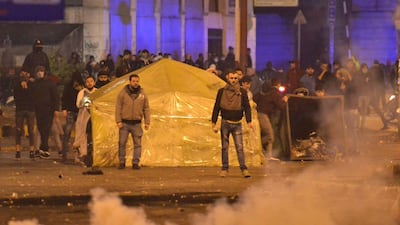People demonstrated in several Lebanese cities on Tuesday against deteriorating living conditions and a lack of social support amid a complete lockdown.
Demonstrators gathered in squares of the southern coastal city of Saida and in Tripoli, northern Lebanon. Others briefly blocked roads in Beirut and in Chtaura, in the Bekaa Valley.
Walid Malas, 22, says the lockdown has stifled his home city of Tripoli, which had been neglected for decades.
“We are living in hell,” he said, “People in Tripoli feel they must choose between dying of coronavirus or dying of hunger.”
Sporadic protests erupted after clashes between crowds and the army on Monday evening in Tripoli, when demonstrators tried to storm a local government building.
The Lebanese Red Cross said it took 10 injured people to hospital and treated 29 others at the scene.
For the past two weeks, small groups of campaigners have demonstrated against the 24-hour curfew, which began on January 14 and is expected to last 25 days.
Tripoli has drawn the largest and most consistent crowds. It is Lebanon’s second-biggest city and one of the poorest in the Middle East, according to UN data.
As Lebanon continues to sink into economic crisis, activists and protesters say the government’s aid plan is not enough to sustain the country’s poor.
Mr Malas, a nurse, considers himself “lucky” to be able to work during the lockdown. But he says he is facing financial difficulties because he does not have a stable income. He dreams of leaving for Dubai or Australia, saying the future in Lebanon seems bleak.
His concerns were echoed by Mohamad Ghazal, 31, a Tripoli resident and supporter of the protests.
“My parents tell me that even during the civil war, the situation was much better than it is today,” he said.
Lebanon has been reeling from a severe economic crisis for more than a year. The situation is compounded by a rising number of coronavirus cases in recent weeks, overwhelming the healthcare sector after the country remained largely open during the Christmas and New Year holidays.
The total lockdown has exacerbated the economic woes. Non-essential shops were forced to close while supermarkets and restaurants can operate on a delivery-only basis.
Many shopkeepers have refused to abide by the rules and opened their stores despite the risk of fines.
Chadi Nachabe, a political activist and member of Tripoli’s Municipal Council, says the total lockdown cannot be enforced without providing social safety nets to Lebanon’s poor.
More than 55 per cent of all Lebanese are poor, the UN estimates, almost double the percentage of 2019.
Mr Nachabe says more than 60 per cent of the workforce in Tripoli relies on daily wages and the state has not offered them another source of income.
“Of course people are not respecting the lockdown and they are angry at the state,” he said.
The government pledged to distribute 400,000 Lebanese pounds (the equivalent of $45) per month to 230,000 families, but activists say that is not enough.
“This aid does not cover everyone, and it is not enough to sustain an entire family,” Mr Nachabe says.
Caretaker Social Affairs Minister Ramzi Moucharafieh told local media on Tuesday that 75 per cent of Lebanese require aid. About seven million people live in the country.








